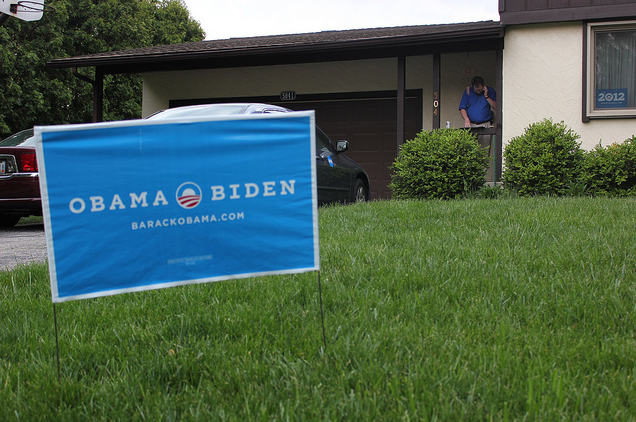 By Alan Bean
By Alan Bean
Driving through a prestigious neighborhood a few days ago, I was accosted by dozens of political yard signs. I use the word “accosted” because the signs were all for candidates I won’t be voting for. If the signs were celebrating my people, I would have felt reassured and motivated.
Surprised by my strong visceral reaction, I got to the root of the matter: the signs hurt my feelings.
I thought of the yard sign I planted on my own front lawn a couple of weeks ago. The intention was to encourage my neighbors to vote for the good guys, but how do people who don’t share my political outlook feel when they drive past my home? Am I hurting their feelings?
Likely not. A solid majority of my neighbors root for the other team. On election day, I can get my ballot seconds after walking through the door; the folks on the other side of the political divide are stuck in a long and winding queue. They don’t mind, of course; that means their candidates are sure to win–at least in this precinct.
My hurt feelings were sparked by a sense of being ganged up on, as if the other side was rubbing my face in my minority status. But there was more to it than that. Our political opinions are deeply rooted in a narrative, a story, a portrait of life fraught with moral significance. Democrats and Republicans subscribe to very different stories. Yard signs reinforce one narrative while denying another. We don’t mean to trample on our neighbor’s personal identities and the rich web of moral narratives that comes with it, but we do it all the time. We do it with yard signs, snarky Facebook comments, and with forwarded emails that reinforce my personal narrative by lampooning yours.
Years ago, Walter Fisher put it this way:
Any story, any form of rhetorical communication, not only says something about the world, it also implies an audience, persons who conceive of themselves in very specific ways. If a story denies a person’s self-conception, it does not matter what it says about the world. In the instance of protest, rival factions’ stories deny each other in respect to self-conceptions and the world. The only way to bridge this gap, if it can be bridged through discourse, is by telling stories that do not negate the self-conceptions that people hold of themselves.
Amateur culture warriors think they can overwhelm the opposition by piling up great piles of facts and evidence. It doesn’t work that way. Recent cognitive research suggests that we are all equipped with sensitive filters that evaluate incoming information at the emotional level before it gets close to our rational faculties. If an idea has a familiar feel, if it comports with our view of the world, it is admitted to the conscious mind; if it does not, we experience a deep, visceral reaction. We are willing to consider new ideas if they are delivered by trusted messengers, but we are suspicious of the most innocuous bromides if the mouthpiece seems alien, odd, or sketchy.
It’s called “confirmation bias”. When the message comes from FOX, liberals don’t believe it because everyone knows those folks have a corporate bias. But when MSNBC says the same thing, you have to believe it. Amateur historian David Barton was repeatedly criticized by professional historians but the evangelical world wasn’t impressed–those guys were just mad because David was exposing their skewed scholarship. That changed when Barton was attacked from the right by dedicated evangelical scholars. Suddenly, conservative Protestants were willing to credit the criticism.
 This explains why two partisans can witness the same debate and draw diametrically opposed conclusions. Over 30% of the audience watching the first debate between president Obama and governor Romney felt the Democrat got the best of the exchange. Most liberals were willing to admit that their man lost badly; but a solid minority were so offended by the mere physical presence of Mitt Romney that they couldn’t give credit where credit was due.
This explains why two partisans can witness the same debate and draw diametrically opposed conclusions. Over 30% of the audience watching the first debate between president Obama and governor Romney felt the Democrat got the best of the exchange. Most liberals were willing to admit that their man lost badly; but a solid minority were so offended by the mere physical presence of Mitt Romney that they couldn’t give credit where credit was due.
It works in reverse, of course. Fifteen percent of the American public is convinced that Mitt Romney, not Barack Obama, is responsible for killing Osama bin Laden. During the Democratic Convention, I received a Facebook message declaring that the very sight of Michelle Obama made my friends sick to her stomach. Michelle Obama? Come on!
This isn’t a problem with liberals or conservatives; it’s the way our minds are wired.
Democrats look at the growing diversity of our complex nation and adopt a live-and-let-live attitude. I might not want my daughter to get an abortion, we say, and I’d be upset if my son came out as gay, but I’m not going to force my beliefs and feelings on other people. We’ve all got to get along here. That’s a weak form of the liberal narrative.
Republicans look at the fragile web of institutions and disciplines that hold our nation together and say we’ve got to draw the line somewhere before our righteous experiment comes apart altogether. Most Americans share both of these narratives, but one side usually dominates the other.
Genuine culture warriors get fired up by one side of this philosophical tension and react in disgust at the merest hint of the other. That’s why their statements are so devoid of mercy or perspective.
During election season, we are all tempted to harbor dark suspicions about the neighbors who sport the wrong sort of yard sign. If my side could crush your side, we reason, all would be well.
An army of unwelcome yard signs may hurt my feelings, but it reminds me that most of the people around me filter facts very differently than I do. If I want to make an impact, I must translate my values into a foreign language. Before I can get people to think like me, I must journey through a strange emotional landscape that doesn’t come naturally to me, I must affirm the full humanity of the folks I am tempted to dismiss.
In Matthew’s Gospel, Jesus learns that John the Baptist has been beheaded by Herod Antipas, a personal friend of the Emperor Tiberius whose appetite for cruelty has few limits. Sensing that his hour has not yet come, Jesus makes a strategic retreat into the wilderness, taking a handful of disciples with him. Jesus is threatened by an alien power that will one day overwhelm him and he feels a desperate need for safety and solitude.
It doesn’t work out. The crowds are so desperate for his healing touch that they pursue him into the wilderness. And when Jesus sees the crowd approaching, he is filled with compassion, for they appeared to him like sheep without a shepherd.
A lot of these people didn’t listen to the sermons Jesus preached or the kingdom stories he told; they just wanted to walk, to see, to hear, to find a respite from unremitting pain. Jesus understood all of that. He knew that in the end he would be abandoned even by his closest friends. He knew the crowds filtered out his kingdom message because it frightened them. It didn’t matter. Jesus had compassion on the crowds precisely because they were like lost sheep without a shepherd. So he taught them, he fed them, and he healed them. Only then did he seek the God-solitude he craved.
It is good for us to stay close to people who experience the world in ways we cannot grasp, to experience the sheeplike lostness of the alien people around us. Only then do we realize, like Isaiah in the temple, “I am a man of unclean lips, and I dwell in the midst of a people of unclean lips.” We are all lost sheep in search of a shepherd and lets get one thing clear: neither Barack Obama, Mitt Romney, or any other human savior can satisfy our deepest need. We don’t even know what we need, but we need it very badly.
So as election day comes rushing to greet us, let’s cut each another a little slack. Let’s honor the full humanity of the people on the ballot, the people lined up to vote, and the people who have dropped out of the political process altogether. The only way to avoid getting your feelings hurt is to experience the longing and lostness of the people behind the yard signs. That emotional terrain should feel familiar.
